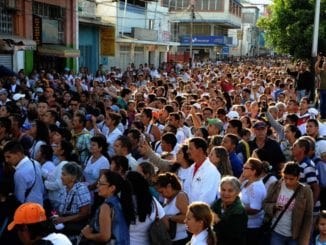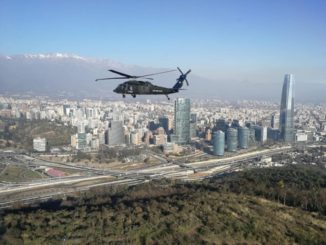
CARACAS – Venezuela’s government responded with light armored vehicles and tear gas on Saturday as opponents of President Nicolas Maduro poured into the streets of Caracas in a highly charged protest movement.
The demonstration came a day after Maduro’s government barred top opposition leader Henrique Capriles from running for office for 15 years. The ban was the latest in a series of steps that critics and foreign governments warn are bringing Venezuela closer to dictatorship.
Authorities on Friday banned Capriles from seeking office for 15 years for alleged administrative irregularities as governor of Miranda state. The move, decried by his supporters and foreign governments, followed last week’s short-lived Supreme Court decision to gut the opposition-controlled legislature of its last vestiges of power.
“Nobody can disqualify the Venezuelan people,” Capriles said from a stage in brief remarks before Saturday’s demonstration began.

The government used the armored vehicles and tear gas in an attempt to break up the crowd as it approached the headquarters of the state-run PDVSA oil company, which sits between wealthier eastern Caracas and downtown.
‘Generators of violence’
As is now customary, authorities had shut down the city’s subway in what’s widely seen as an attempt to discourage people from joining the protests, many of which have ended in scores of arrests, tear gas and rubber bullets.
In another intimidation tactic, police also posted on social media mugshots of protesters taken undercover at recent demonstrations with a request for information about the whereabouts of the unidentified “generators of violence.”

As the most dominant figure in the opposition over the past decade, Capriles has been at the forefront of the protests, the most combative since a wave of anti-government unrest in 2014 that was blamed for dozens of deaths. The two-time presidential candidate said Friday the order stripping him of his ability to run in future elections only strengthens his resolve to resist on the streets.
“When the dictatorship squeals, it’s a sign we’re advancing,” he said in a rousing speech surrounded by other leading opposition figures, many of whom themselves have been targeted. “The only one who is disqualified here is you, Nicolas Maduro.”
Capriles lost to Maduro in last run for the presidency by less than 250,000 votes.

Leaders in the ruling socialist party have accused the opposition of trying to provoke a bloodbath and coup of its own. Maduro didn’t comment on the comptroller general’s order in an appearance late Friday on state TV, but urged his supporters not to be distracted by tough language coming from “Capriloca,” a play on the Spanish word for “crazy.”
“The right wing’s treason of our national interests is cause for indignation,” said Maduro.

The protest movement’s immediate goal appears to be forcing Maduro to call elections. Authorities last year cancelled an opposition campaign to force a recall referendum on Maduro and no date has yet been set for gubernatorial elections that were supposed to take place last year.
Together with jailed hardliner Leopoldo Lopez, Capriles is the most-popular opposition leader. With both seemingly out of the running, the government may be trying to manipulate the electoral playing field to leave the opposition with less viable options should the government bow to pressure and call presidential elections before they’re scheduled in 2018, analysts said.



